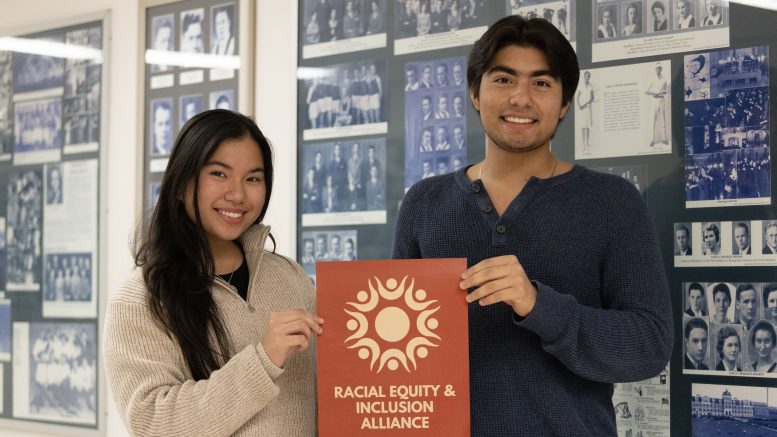Racial issues are widely important for student voters this election season. To inform the student body, one group invited provincial candidates to talk about their stances.
Allisther De Castro and Ivan Nunez-Gamez are co-presidents of the Racial Equity and Inclusion Alliance (REIA), a student-run organization on campus with the goal of amplifying the voices of BIPOC students.
Nunez-Gamez emphasized the importance of political engagement among students. “Civic engagement is crucial,” he said.
“As Winnipeg is a multi-cultural hub, and so is the University of Manitoba, we found ourselves [with] the duty of displaying what each party had to offer to the racialized community.”
Nunez-Gamez, De Castro and the rest of REIA gave notice to the Manitoba Liberal Party, Manitoba Green Party, Manitoba New Democratic Party (NDP) and Manitoba Progressive Conservative (PC) Party. The group also reached out to the Communist Party and the Keystones and did not receive a response. The PCs declined to send a representative via email three hours prior to the event beginning.
Iqra Tariq, Liberal MLA candidate for Union Station, Bernadette Smith, NDP MLA candidate for Point Douglas and Janine Gibson, leader of the Green party and MLA candidate for Wolseley made up the panel.
The panel was divided into three sections: systemic barriers, achieving racial equity in post-secondary education and reconciliAction. De Castro said the third portion, named reconciliAction, was used to allow candidates to highlight their parties’ commitment to policies that take action to move reconciliation forward.
Systemic barriers
When asked about systemic factors contributing to racialized poverty rates in Winnipeg, NDP candidate Smith said that the NDP would institute scholarships and bursaries for those who need funding to access education.
Tariq’s response covered the Liberal party’s platform on homelessness and income support, while also addressing addiction support. She said it is important to “become aware of the risk factors that put people into poverty, and have interventions in place to prevent these things before they become actual crises.”
Gibson said that the Green party would have a “basic income guarantee” to help address the issues of poverty in Winnipeg. She spoke on her personal experience with the “mincome” program, part of an experimental guaranteed income.
Gibson said our province should be a “friendly Manitoba for all, and not just for the privileged.”
Racial equity in post-secondary education
Candidates were asked whether or not each party would support a policy mandating the collection of data on religion, race, Indigenous identities and ethnic origins of students.
Gibson said she would institute this policy because of the lack of respect rooted in colonialism that many individuals are facing.
“We are all human beings with human rights that deserve to be treated equal under the law,” she said.
Gibson emphasized the need for “transparency and accountability” in a government that regulates individuals’ identities with the goal of tracking those who are missing.
Smith talked about the lack of Indigenous representation within universities and highlighted the need to focus on eradicating the systemic barriers that block Indigenous people and people of colour from accessing the education system.
She said that the government needs to change things from “the inside out.”
Tariq shared her experiences as a person of colour and religious minority running for office. Her signs have been vandalized and she has received the message that some constituents “don’t want this kind of representation.”
She said the Liberal party, if they form a majority government, will offer funding to universities and colleges and reinstate health care for international students who are giving “tens of thousands if not millions of dollars” to the Manitoba economy as students or after they graduate.
ReconciliAction
In the final section, participants were asked if they support a search of the Prairie Green Landfill.
It is thought that the remains of missing Indigenous women are located at the Prairie Green Landfill. Despite many calls to search the landfill, Manitoba Premier Heather Stefanson said she will not support a search.
In response to the question, Tariq said, “This is human life we’re talking about, and we need to return to our basic morals and values to just respect the integrity of people.”
She emphasized that justice needs to be served and that the families of the missing women need to get answers, and additionally, that preventative measures need to be taken so this does not happen again.
The Green party believes that, while the landfill should be searched, there shouldn’t be landfills in the first place. Gibson said that the Green party supports life cycle legislation. Those who create products are responsible for disposing them. She said that searching the landfill would be “a major step towards reconciliation,” honouring life and a chance to address the harm
done to Turtle Island by having landfills at all.
Smith agreed with the importance of searching the landfill. Smith has a sister that has been missing for 15 years. She and her family have been searching for her sister every year and for all they know, she could be in the landfill, she said.
“These are humans, and they don’t deserve to be left there like they’re garbage, they’re not disposable,” she said.
“They are sacred beings, and we need to treat them as such, and they deserve to be looked for like any other person would.”





